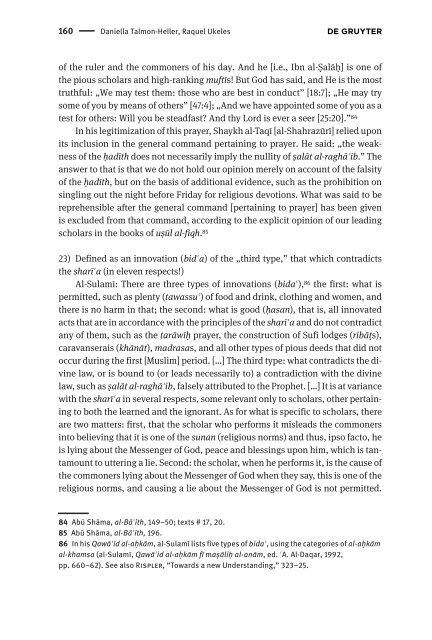0021-1818_islam_98-1-2-i-259
0021-1818_islam_98-1-2-i-259
0021-1818_islam_98-1-2-i-259
You also want an ePaper? Increase the reach of your titles
YUMPU automatically turns print PDFs into web optimized ePapers that Google loves.
160 Daniella Talmon-Heller, Raquel Ukeles<br />
of the ruler and the commoners of his day. And he [i.e., Ibn al-Sala1] is one of<br />
the pious scholars and high-ranking muftis! But God has said, and He is the most<br />
truthful: „We may test them: those who are best in conduct” [18:7]; „He may try<br />
some of you by means of others” [47:4]; „And we have appointed some of you as a<br />
test for others: Will you be steadfast? And thy Lord is ever a seer [25:20].” 84<br />
In his legitimization of this prayer, Shaykh al-Taq\ [al-Shahrazur\] relied upon<br />
its inclusion in the general command pertaining to prayer. He said: „the weakness<br />
of the hadith does not necessarily imply the nullity of salat al-ragha#ib.” The<br />
answer to that is that we do not hold our opinion merely on account of the falsity<br />
of the hadith, but on the basis of additional evidence, such as the prohibition on<br />
singling out the night before Friday for religious devotions. What was said to be<br />
reprehensible after the general command [pertaining to prayer] has been given<br />
is excluded from that command, according to the explicit opinion of our leading<br />
scholars in the books of usul al-fiqh. 85<br />
23) Defined as an innovation (bid^a) of the „third type,” that which contradicts<br />
the shari^a (in eleven respects!)<br />
Al-Sulam\: There are three types of innovations (bida^), 86 the first: what is<br />
permitted, such as plenty (tawassu^) of food and drink, clothing and women, and<br />
there is no harm in that; the second: what is good (hasan), that is, all innovated<br />
acts that are in accordance with the principles of the shari^a and do not contradict<br />
any of them, such as the tarawih prayer, the construction of Sufi lodges (ribats),<br />
caravanserais (khanat), madrasas, and all other types of pious deeds that did not<br />
occur during the first [Muslim] period. […] The third type: what contradicts the divine<br />
law, or is bound to (or leads necessarily to) a contradiction with the divine<br />
law, such as salat al-ragha#ib, falsely attributed to the Prophet. […] It is at variance<br />
with the shari^a in several respects, some relevant only to scholars, other pertaining<br />
to both the learned and the ignorant. As for what is specific to scholars, there<br />
are two matters: first, that the scholar who performs it misleads the commoners<br />
into believing that it is one of the sunan (religious norms) and thus, ipso facto, he<br />
is lying about the Messenger of God, peace and blessings upon him, which is tantamount<br />
to uttering a lie. Second: the scholar, when he performs it, is the cause of<br />
the commoners lying about the Messenger of God when they say, this is one of the<br />
religious norms, and causing a lie about the Messenger of God is not permitted.<br />
84 Abu Shama, al-Ba^ith, 149–50; texts # 17, 20.<br />
85 Abu Shama, al-Ba^ith, 196.<br />
86 In his Qawa#id al-ahkam, al-Sulam\ lists five types of bida^, using the categories of al-ahkam<br />
al-khamsa (al-Sulam\, Qawa#id al-ahkam fi masalih al-anam, ed. ^A. Al-Daqar, 1992,<br />
pp. 660–62). See also Rispler, “Towards a new Understanding,” 323–25.


